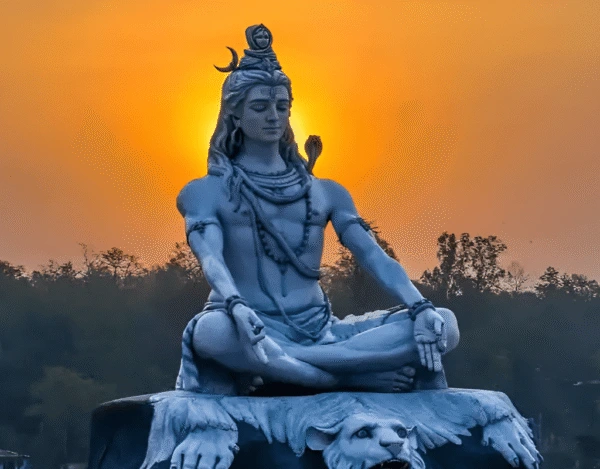Now Reading: Sawan 2025: The Power And Amazing Truths Behind India’s Most Sacred Sawan SomwarFast
-
01
Sawan 2025: The Power And Amazing Truths Behind India’s Most Sacred Sawan SomwarFast
Sawan 2025: The Power And Amazing Truths Behind India’s Most Sacred Sawan SomwarFast

Today, July 11, 2025, marks the highly anticipated beginning of Sawan, or Shravan, as a profound spiritual energy begins to ripple across India.
The monsoon clouds gather, bringing not just rain but also a deep sense of devotion. For millions, Sawan means one thing above all: the sacred Sawan Somwar fasts.
But have you ever truly wondered why Mondays in this particular month hold such an extraordinary, almost magnetic, significance for Lord Shiva’s devotees? What makes these fasts so sacred, and why is Shiva the ultimate focus of this month-long spiritual journey?

This isn’t merely about abstaining from food. The Sawan Somwar fasts are a meticulously crafted spiritual and physical discipline, rooted in ancient lore, astrological alignments, and profound wisdom designed to purify, protect, and profoundly connect a devotee with the divine, especially Lord Shiva.
Prepare to uncover the powerful, often surprising, reasons behind this unique Hindu observance.
The Cosmic Lifesaver: Shiva and the Halahala Poison – The Ultimate Reason for Sawan’s Sacredness
At the very core of Sawan’s sanctity lies an epic tale that reveals Lord Shiva’s unparalleled compassion: the Samudra Manthan – the Churning of the Cosmic Ocean. According to ancient Hindu scriptures, gods and demons ceaselessly churned the primordial ocean to obtain the elixir of immortality (Amrita). However, before the nectar emerged, a terrifying, all-consuming poison known as Halahala surfaced, threatening to annihilate the entire universe.

Sawan
The gods, desperate and terrified, appealed to Lord Shiva for salvation. In an act of immense selflessness, Shiva, the Mahadev (Great God), consumed the entire volume of this deadly poison.
His divine consort, Goddess Parvati, swiftly clutched his throat to prevent the poison from descending to his stomach and destroying him, or indeed, the cosmos. This heroic act caused his throat to turn blue, earning him the revered name Neelkanth (the Blue-Throated One).
Why Sawan, Why Monsoon?
It is widely believed that this universe-saving incident occurred precisely during the month of Sawan. The monsoon rains, which typically begin around this time, are said to have poured down to soothe the burning effect of the poison on Shiva’s throat.
Therefore, observing fasts and offering water (especially sacred Ganga jal) to Shiva during Sawan is an act of profound gratitude for his ultimate sacrifice, acknowledging him as the protector of all existence.
Every offering, every drop of water, every moment of fasting is a prayer of thanks, a plea for him to absorb our own inner “poisons” – negativity, worries, and impurities – and bring us peace.
Monday’s Mystical Connection: Why Somwar is Shiva’s Power Day

While every day holds significance in Hinduism, Mondays (Somwar) are universally considered Lord Shiva’s day. The name ‘Somwar’ itself is derived from ‘Soma,’ which refers to the Moon, and Lord Shiva is intrinsically linked to the Moon, wearing the crescent moon on his head.
However, during Sawan, the significance of Mondays becomes extraordinarily amplified. Observing a fast on a Sawan Somwar is believed to be exponentially more potent and fruitful than a Monday fast at any other time of the year.
This is why millions flock to Shiva temples on these specific Mondays, performing elaborate abhishekams (ritual bathing of the Shiva Lingam) with sacred substances like milk, water, honey, curd, ghee, and sugar, and offering cherished items like bel patra, dhatura, and white flowers.
The Tale of Parvati and the Solah Somwar: The popular legend of Goddess Parvati’s rigorous penance further solidifies the power of Sawan Somwar fasts.
Long before she became Shiva’s consort, Parvati ardently desired Lord Shiva as her husband. To achieve this, she observed a challenging fast for 16 consecutive Mondays (Solah Somwar Vrat), commencing it during Sawan. Her unwavering devotion and self-discipline finally pleased Lord Shiva, who accepted her as his wife.
This powerful narrative inspires countless unmarried girls even today to undertake the Solah Somwar Vrat, praying for an ideal life partner.
Married women also observe these fasts devoutly for the longevity, health, and prosperity of their spouses, believing that Shiva blesses sincere devotees with marital bliss and harmony.
The very first Sawan Somwar of 2025 is just around the corner, falling on July 14th, making today’s beginning of Sawan a crucial time for making this spiritual resolve.
Beyond Ritual: The Profound Benefits of Sawan Somwar Fasts
The sacredness of Sawan Somwar fasts goes far beyond mythology, touching upon holistic well-being:
- Ayurvedic Detox for the Body: Ancient Indian wisdom, particularly Ayurveda, recognized that the monsoon season (Sawan) can weaken the body’s digestive fire (Agni) due to increased humidity. Consuming heavy, fried, or non-vegetarian foods during this time can lead to digestive issues and toxin accumulation. Sawan fasts, especially when following a satvik diet (light, easily digestible foods like fruits, roots, and dairy), provide a much-needed break to the digestive system, allowing for natural detoxification and balance. It’s a seasonal cleansing designed for optimal health.
- Mental Clarity and Discipline: When the body is lighter and less burdened by strenuous digestion, the mind often becomes clearer, sharper, and less prone to lethargy. The act of fasting itself is a powerful form of tapasya (spiritual discipline). It cultivates immense willpower, teaches self-control, and helps in managing desires. This internal purification fosters a greater sense of calm, enhances concentration, and prepares the devotee for deeper spiritual practices. It’s a mindful way to cleanse both physical and mental impurities, helping to cut through the digital noise of our modern lives.
- Spiritual Upliftment and Connection: By reducing worldly distractions and physical comforts, the mind is better able to focus on prayer, meditation, and chanting. This intensified focus allows for a deeper, more profound connection with Lord Shiva. Chanting powerful mantras like “Om Namah Shivaya” or the Maha Mrityunjaya mantra during Sawan Somwar is believed to purify the mind, align the devotee with divine vibrations, and attract abundant blessings.
- Fulfillment of Wishes and Overcoming Obstacles: Devotees observe Sawan fasts with specific intentions, believing that Lord Shiva, the Bholenath (the innocent, easily pleased Lord), is particularly receptive to prayers during this period. Whether it’s seeking an ideal life partner, good health for family members, success in endeavors, or simply inner peace and removal of obstacles, the sincere devotion during Sawan Somwar is believed to pave the way for desires to be fulfilled.
As Sawan begins today, carrying the promise of revitalization and deep spiritual connection, the Sawan Somwar fasts stand as a timeless testament to faith, discipline, and the profound wisdom embedded in Indian traditions.
It’s a powerful invitation to millions to purify, reflect, and seek the boundless blessings of Lord Shiva amidst the refreshing showers of the monsoon.
Are you observing Sawan Somwar fasts this year? What does this sacred practice mean to you personally, and what blessings do you seek from Lord Shiva?
Share your insights and traditions in the comments below – your story might inspire others!





















